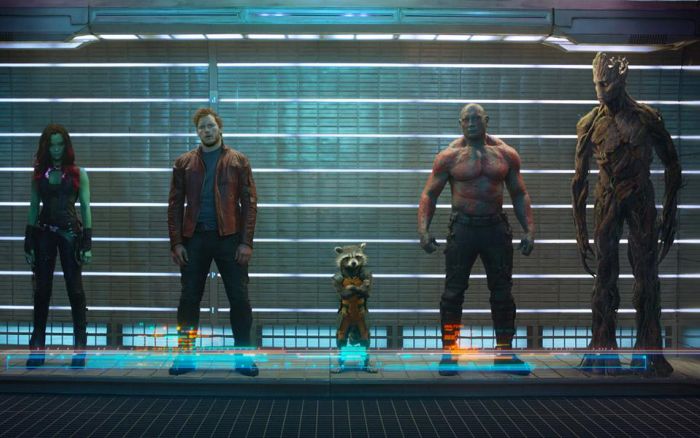What Made Guardians of the Galaxy So Darn Good?

Like many of you, I went and saw Guardians of the Galaxy last week. Marvel’s latest comic book movie has certainly struck a chord with moviegoers, grossing over $300 million dollars to date. And it did so despite not featuring any of Marvel’s more well-known heroes (e.g., Captain America, Iron Man, The Hulk). Indeed, the title is almost a second tier property, at least in terms of popularity, and yet it has received almost universal acclaim. (The movie currently enjoys a 92% rating on RottenTomatoes.)
So, despite being a lesser-known title with no famous characters, why has Guardians of the Galaxy received so much critical and popular love? Well, for starters, it has an awesome soundtrack:
Lesser films might have populated their soundtracks with a similar assortment of surefire mood-setters (and download-inspirers), but director James Gunn — who also developed an orchestral score with longtime collaborator Tyler Bates — found a way to fully integrate the era-specific music into the plot of “Guardians,” using the music to provide an emotional connection for Star-Lord (Pratt) to his late mother, and by association, his long-lost homeworld.
Or, as BuzzFeed’s Alison Willmore and Adam B. Vary write:
The music that carries Guardians of the Galaxy through its interplanetary adventure is even more joyously unhip. Marvel’s latest movie has an AM Gold soundtrack that, on one level, is completely at odds with its sci-fi setting, and that on another, better level, is absolutely perfect. It’s powered by a literal cassette mixtape — Awesome Mix Vol.1 — made for Peter Quill (Chris Pratt) when he was a Midwestern kid, by a dying mom who wanted him to hear her favorite songs. They’re ’60s and ’70s radio fodder, classic and cheesy pop hits that have survived enough decades to accrue the heft of collective memory. When the title splashes across the screen, it’s over a wide shot of Peter with his Sony Walkman headphones on, rocking his way through the craggy landscape of an abandoned planet to the sounds of Redbone’s “Come And Get Your Love.”
Then there’s Chris Pratt’s goofy charisma. I’ll admit, it was hard to see him as an intergalactic hero after watching him play Andy Dwyer on Parks and Recreation for so long, but the moment he flipped off the Nova Corps, I was sold. Basically, as Kevin Fallon puts it, Pratt’s Star-Lord is the “Everydude Superhero”:
The best praise I can give Guardians of the Galaxy is that if I was 12 years old right now it might be my favorite movie of all time. The movie was aggressively fun, and, despite its sci-fi setting and outlandish plot, somehow relatable. There wasn’t just comedy in it, as there is in many superhero movies, but it was actually a comedy. It’s a movie more interested in being superficially entertaining than offering some moody rumination on the nature of heroism and good vs. evil, and the linchpin holding it all together was the casting of Chris Pratt, who will henceforth be referred to as the Everyman superhero. (And the manliest French braider who ever was.)
[…]
Modern superheroes are too often modeled after the unattainable ideal. They become slaves to the Herculean exercise regimens suffered in order to manufacture chiseled bodies to match their chiseled jaws. They’re often holier-than-thou, altruistic, and, for lack of a better word, perfect. There is often two character types in Hollywood, especially in this genre: the guy you wish you were and the guy you wish you were best friends with. Pratt’s Peter Quill breaks that mold. He’s the guy you already are.
Finally, there’s no denying that Guardians of the Galaxy is very different from the other comic book movies out there, both in terms of tone and in how it approaches typical comic book movie tropes.
Pretty much everything in Guardians of the Galaxy is retro, one way or the other. The vision of outer space and aliens and spaceships is straight out of classic space opera, but also 1970s Marvel comics, classic anime, and old Moebius bandes dessinees. The action-adventure stuff is pure 1980s: Indiana Jones and Kurt Russell, goofy-ass heroes who got knocked on their asses on the regular. They don’t make movies this unabashedly spacey any more, nor do they make adventures this upbeat and good-natured.
[…]
I already mentioned that there’s a lot of intentionally cheesy stuff in this movie — not just the music, but the cliché-ridden storytelling and some of the little character moments. To some extent, the movie gets away with the cheese because of the riotous humor — but also, you sense that the movie 100 percent invests in the cheese, and believes in it. Like Stevie Wonder calling to say he loves you, this movie means it from the bottom of its heart.
By embracing the corny instead of keeping an ironic distance, Guardians winds up being able to work on a few levels at once: funny and sad, superheroic and self-mocking. And Gunn seems to be making the case for cheese as a valid aesthetic, not just something that has to be deracinated and reimagined endlessly to be acceptable to “sophisticated” audiences.
All that being said, I’m not so sure that Guardians of the Galaxy is the best Marvel film to date, a sentiment that I’ve seen here and there. The Avengers still holds that distinction for me, but Guardians of the Galaxy is neck-and-neck with Iron Man for the #2 spot. (Guardians of the Galaxy does have The Avengers beat when it comes to Ranger Rick references, however.) I’m perfectly willing to change my assessment, though, after another viewing or two.
That being said, I do think it’s the most ambitious Marvel film, from using largely unknown characters to its goofball approach to just throwing audience members into its cosmic setting. Which is just another of saying, bring on 2017 and Guardians of the Galaxy 2: More Awesome Mixtapes!